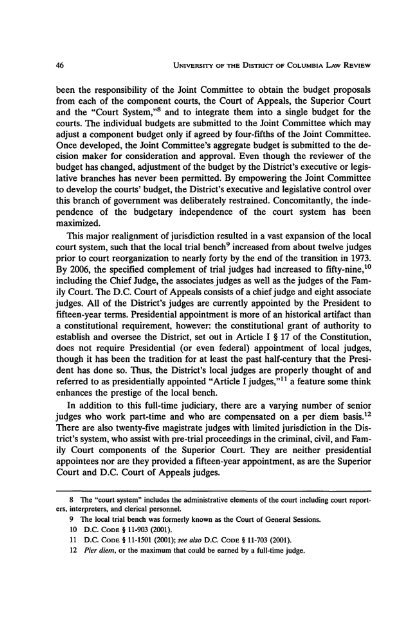Download Electronic Version - UDC Law Review
Download Electronic Version - UDC Law Review
Download Electronic Version - UDC Law Review
You also want an ePaper? Increase the reach of your titles
YUMPU automatically turns print PDFs into web optimized ePapers that Google loves.
46 UNIVERSITY OF THE DISTRlCf OF COLUMBIA LAW REVIEW<br />
been the responsibility of the Joint Committee to obtain the budget proposals<br />
from each of the component courts, the Court of Appeals, the Superior Court<br />
and the "Court System,"S and to integrate them into a single budget for the<br />
courts. The individual budgets are submitted to the Joint Committee which may<br />
adjust a component budget only if agreed by four-fifths of the Joint Committee.<br />
Once developed, the Joint Committee's aggregate budget is submitted to the decision<br />
maker for consideration and approval. Even though the reviewer of the<br />
budget has changed, adjustment of the budget by the District's executive or legislative<br />
branches has never been permitted. By empowering the Joint Committee<br />
to develop the courts' budget, the District's executive and legislative control over<br />
this branch of government was deliberately restrained. Concomitantly, the independence<br />
of the budgetary independence of the court system has been<br />
maximized.<br />
This major realignment of jurisdiction resulted in a vast expansion of the local<br />
court system, such that the local trial bench 9 increased from about twelve judges<br />
prior to court reorganization to nearly forty by the end of the transition in 1973.<br />
By 2006, the specified complement of trial judges had increased to fifty-nine ,10<br />
including the Chief Judge, the associatesjudges as well as the judges of the Family<br />
Court. The D.C. Court of Appeals consists of a chief judge and eight associate<br />
judges. All of the District's judges are currently appointed by the President to<br />
fifteen-year terms. Presidential appointment is more of an historical artifact than<br />
a constitutional requirement, however: the constitutional grant of authority to<br />
establish and oversee the District, set out in Article I § 17 of the Constitution,<br />
does not require Presidential (or even federal) appointment of local judges,<br />
though it has been the tradition for at least the past half-century that the President<br />
has done so. Thus, the District's local judges are properly thought of and<br />
referred to as presidentially appointed "Article I judges,,,l1 a feature some think<br />
enhances the prestige of the local bench.<br />
In addition to this full-time judiciary, there are a varying number of senior<br />
judges who work part-time and who are compensated on a per diem basis. 12<br />
There are also twenty-five magistrate judges with limited jurisdiction in the District's<br />
system, who assist with pre-trial proceedings in the criminal, civil, and Family<br />
Court components of the Superior Court. They are neither presidential<br />
appointees nor are they provided a fifteen-year appointment, as are the Superior<br />
Court and D.C. Court of Appeals judges.<br />
8 The "court system" includes the administrative elements of the court including court reporters,<br />
interpreters, and clerical personnel.<br />
9 The local trial bench was formerly known as the Court of General Sessions.<br />
10 D.C. CoDE § 11-903 (2001).<br />
11 D.C. CODE § 11-1501 (2001); see also D.C. CODE § 11-703 (2001).<br />
12 Pier diem, or the maximum that could be earned by a full-time judge.














